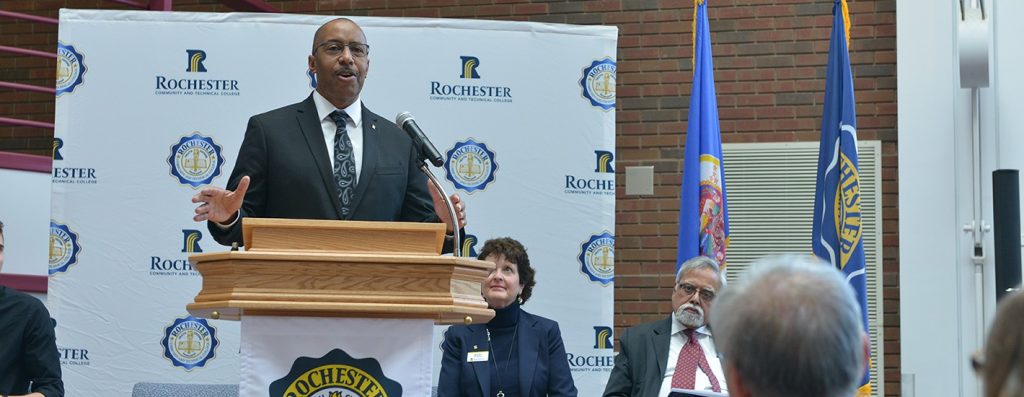
Recently, I was honored being the keynote speaker at the local Dr. Martin Luther King, Jr. Breakfast Celebration. Since the breakfast, I have had several follow-up conversations with individuals who were in attendance, including a conversation with Judy Kingsbury, my “boss” (officially the executive assistant to the RCTC President). Judy and I often have deep, courageous discussions about varying topics, including race. Our thinking and perspectives are often fashioned through the lenses of our individual life experiences. I encourage you to not shy away from having those types of conversations as they are important in understanding various issues, like race.
Race sets groups of people apart based on certain traits all shared by that group. For instance, a person’s skin color or the texture of their hair. Did you know that today’s biologists do not recognize race as a biologically valid classification because there are more genetic variations within groups than between them? According to a 2002 study by Stanford University scientists, the genetic similarity between one human and another is 99.9 percent. That means it doesn’t matter if your ancestors came from Nigeria or Norway, genetically, we are only different by .1 percent.
Several years ago, there was a documentary entitled, “Race, The Power of an Illusion.” The documentary argues that race is an illusion, made up to separate and divide people, not unite them. All of this makes me wonder why, in 2019, does “race” still separate us. How alike or how different are we really? Whether you’re a man or woman, or you have European, Asian, or African ancestries, how different are we? Regardless of what you think, you are not much different than any other human being on planet earth.
My first administrative job in higher education was when I was hired as an associate dean at a community college. One person on the search committee was vicious toward me during the interview process and somewhat indifferent with me after I was hired. We are now friends.
This individual told me the only reason I was hired was because I was black. For whatever reason, her words were unsettling with my soul. I went to the director of human resources and had a direct conversation with him.
I asked, “Please tell me the truth, was I only selected because I was black?”
He told me “Absolutely not.”
He said I was hired because I was the best candidate. His words meant a lot to me. In Edgar Allen Poe’s work, “The Power of Words,” he writes “Did there not cross your mind some thought of the physical power of words? Is not every word an impulse on the air?”
One person’s words made me feel hurt; the other person’s words helped heal my hurt. Our words reflect our innermost thoughts, feelings, beliefs and actions or nonactions toward others. Whatever a person thinks in their heart, so are they. Please be careful how we speak to each other, as words are powerful.
All of us have biases. Most of these biases are from ignorance from not making the effort to spend time with people who are different from us because of their race (illusion), religion, or sexual orientation. I believe that also holds true in the workplace. The differences between us are minute. Faculty in liberal arts are less than .1 percent different than faculty in career and technical programs. The similarities of those working in student affairs almost mirror those working in facilities. Our daily tasks may be different, but we are not. We’re all here for the same reason at the end of the day.
Our forefathers may not have realized their words, “We hold these truths to be self-evident, that all men are created equal. . . ” would be as relevant today as they were in the 1700s, but they are. All men and women are created equally. We’re all brothers and sisters at RCTC. As I often preach “team” and “family,” we must be ready as a unit to do what it takes to educate the next workforce generation. And, with February being designated Black History Month, I encourage you to attend some of the events scheduled for the month.
And remember: “We are more alike, my friends, than we are unalike,” according to Maya Angelou.
RCTC President Jeffery Boyd
